Georgia in Turmoil: A Struggle for a European Future
Protests erupt in Georgia following the government's suspension of EU talks. Concerns grow over the country's shift towards pro-Russian policies, as opposition and citizens push for democratic reforms. Tensions escalate with widespread demonstrations, drawing international attention and condemnation over the use of force by authorities.

Protests surged in Georgia's capital, Tbilisi, as citizens clashed with police over the government's decision to halt European Union accession talks. Sunday marked the fourth consecutive night of unrest, with signs that opposition was spreading nationwide against what many perceive as anti-Western policies.
The situation intensified after the government announced a four-year freeze on EU negotiations, sparking concerns over democratic backsliding. Thousands of pro-EU demonstrators confronted police equipped with tear gas and water cannons. In Tbilisi, protesters gathered on Rustaveli Avenue, hurling fireworks at law enforcement, who responded with water cannon salvos.
President Salome Zourabichvili and opposition leaders alleged electoral fraud in recent polls, urging the cessation of Georgian Dream's increasingly authoritarian tendencies. Georgia's political turbulence has drawn international alarm as Russia monitors developments closely, seeing parallels with Ukraine's tumultuous path.
(With inputs from agencies.)









